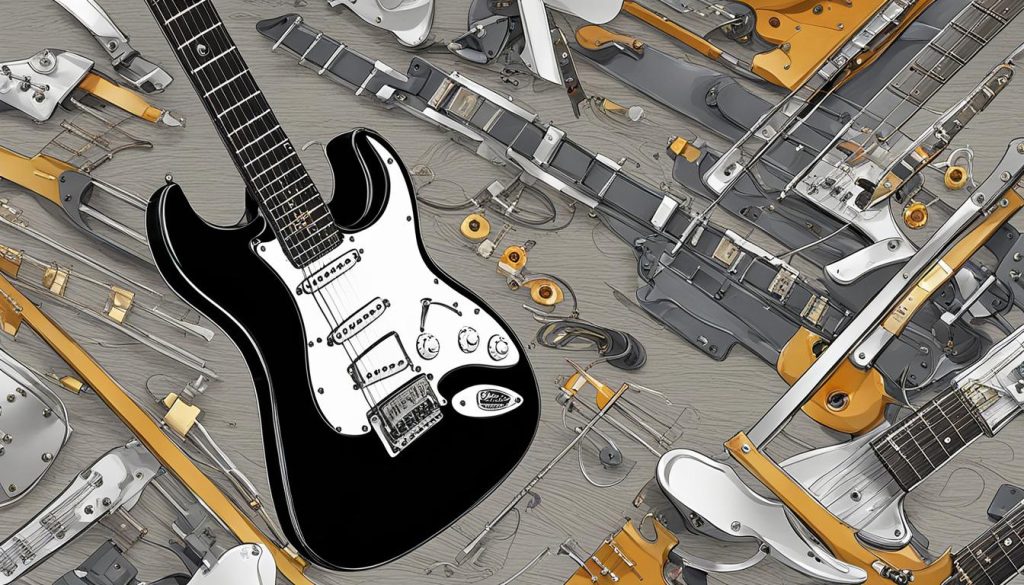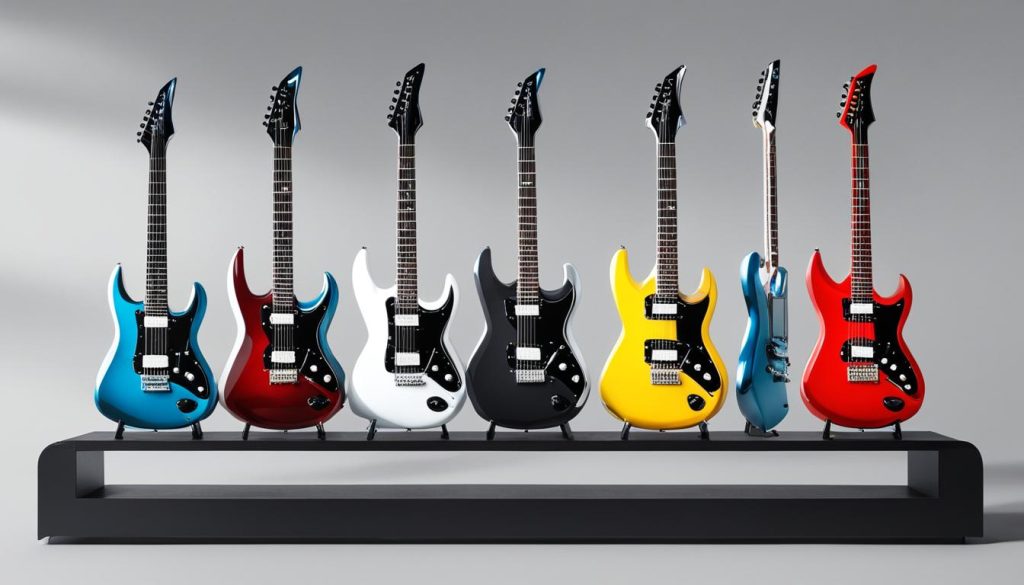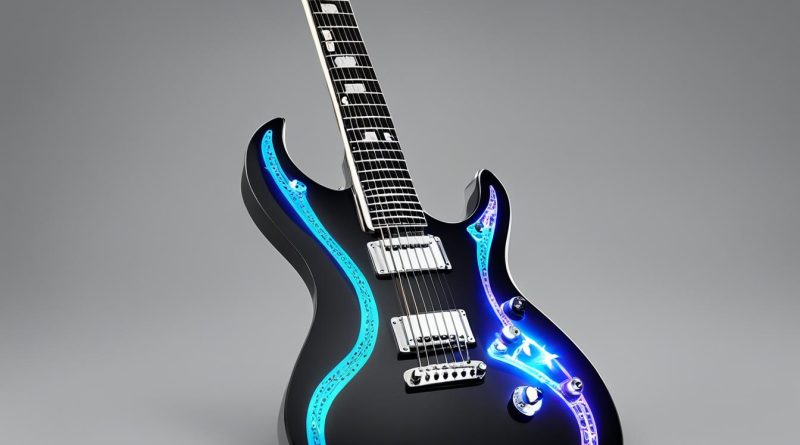Ultimate Electric Guitar Guide for Beginners
Are you a music lover looking to learn the electric guitar? Congratulations on taking the first step towards becoming a rockstar! Whether you’re into heavy metal, blues, or pop music, the electric guitar is a versatile instrument that can help you create your own unique sound. With so many types and brands available, it can be overwhelming for beginners to choose the right one. But don’t worry! This comprehensive guide will provide you with all the information you need to become a pro at buying and playing the electric guitar.
Key Takeaways
- The electric guitar is a versatile musical instrument that can help create your own unique sound.
- There are many different types of electric guitars available, including solid body, semi-hollow body, and hollow body guitars.
- When choosing the right electric guitar, consider factors such as body shape, neck construction, pickups, and brands.
- It’s important to choose an electric guitar that suits your playing style and budget.
- The world of electric guitars is vast and exciting, and this guide is here to help beginners navigate it.
Understanding the Electric Guitar
An electric guitar is a musical instrument that uses one or more pickups to convert the vibration of its strings into electrical signals. These signals are then amplified by a guitar amplifier to produce sound. Unlike an acoustic guitar, an electric guitar needs an external source to produce sound.
Electric guitars come in various shapes and sizes, and each component of the guitar contributes to its unique sound. It’s essential to understand the different parts of an electric guitar and how they work together to produce the desired tone.
Components of an Electric Guitar
The main components of an electric guitar include:
- Body
- Neck
- Fingerboard
- Headstock
- Pickups
- Bridge
- Tuners
- Volume and tone knobs
The body of an electric guitar can be made of different materials, including solid wood, laminated wood, or a combination of both. The body shape and material can significantly affect the tone of the guitar.
The neck of an electric guitar is attached to the body and can be made of different types of wood, such as maple, mahogany, or rosewood. The neck construction can be a bolt-on, set-in, or neck-through design, which also impacts the instrument’s sound.
The fingerboard is a flat part of the neck where the player presses the strings to produce the desired notes. The most common materials used in fingerboards are maple and rosewood.
The pickups are responsible for converting the vibration of the strings into an electrical signal. There are various types of pickups, including single-coil, humbucker, and P90, each with a unique sound.
The bridge is where the strings are attached to the body of the guitar. There are different types of bridges, including fixed bridges and floating bridges, and they can affect the guitar’s tuning stability and sustain.
The tuners or machine heads are used to tune the guitar’s strings by adjusting the string tension. The volume and tone knobs control the output level and frequency response of the guitar.
Types of Electric Guitars
There are three main types of electric guitars:
- Solid body electric guitars, which are the most common type and have a solid body with no sound holes.
- Semi-hollow body electric guitars, which have a solid center block with hollow wings on either side.
- Hollow body electric guitars, which are fully hollow and produce a more resonant sound.
Each type of electric guitar has its unique sound and is suitable for different genres and playing styles.

Choosing the Right Electric Guitar
When it comes to buying an electric guitar, it can be overwhelming with the vast selection of options available in the market. Here are some expert tips to help you choose the perfect electric guitar for your playing style and budget:
- Determine your playing style: Before making a purchase, identify what type of music you want to play. Different genres require specific features, so knowing your preferred style will help narrow down your options.
- Consider body shape and material: The shape and material of the guitar have an impact on its tone. Solid body guitars produce a brighter sound and are ideal for rock and heavy metal, while semi-hollow and hollow body guitars are more suited for jazz and blues.
- Check the neck construction: Neck construction affects the playability of the guitar. Bolt-on necks are easier to maintain and repair, while set-in necks offer better sustain and resonance.
- Inspect the pickups: The pickups are responsible for converting the guitar’s vibrations into electrical signals, which are then amplified. Different pickups offer various tones, so test out a few different options to find the sound you prefer.
- Research reputable brands: When purchasing electric guitars online or in-store, research the most reliable brands to ensure the instrument’s quality. Some popular brands include Fender, Gibson, and Ibanez.
Keep in mind that the most expensive electric guitar doesn’t necessarily mean it’s the best for you. Always choose the guitar that feels comfortable in your hands and sounds great to your ears, regardless of the price tag. Happy shopping!

Conclusion
Choosing the right electric guitar can be an overwhelming task for beginners, but with the information provided in this guide, it should become a lot easier. Remember to consider factors such as body shape, neck construction, and pickups when selecting an electric guitar that is right for you.
It is also important to set a budget for your purchase and to try out different guitars before making a decision. Don’t be afraid to ask for advice from experienced players or music store staff.
Ultimately, finding the perfect electric guitar is a journey that begins with a single step. Whether you are looking to rock out or play some smooth jazz, there is an electric guitar out there that is perfect for your style and needs.
So, take the plunge and start your electric guitar journey today. The world of music is waiting for you!
FAQ
Can I learn to play the electric guitar as a beginner?
Absolutely! The electric guitar is a popular choice for beginners, and with dedication and practice, anyone can learn to play. It’s important to start with the basics, such as learning chords and proper technique, and gradually progress to more advanced techniques as you build your skills.
What are the main components of an electric guitar?
An electric guitar consists of several main components, including the body, neck, fretboard, pickups, bridge, and controls. Each of these components contributes to the overall sound and playability of the instrument.
What type of electric guitar should I choose?
The type of electric guitar you choose will depend on your personal preferences and playing style. Solid body guitars are versatile and suitable for various genres, while semi-hollow and hollow body guitars offer a warmer tone and are often preferred by jazz and blues players. It’s important to try out different types of guitars to find the one that feels comfortable and sounds right to you.
What should I consider when buying an electric guitar?
When purchasing an electric guitar, consider factors such as your budget, preferred playing style, and skill level. Look for a guitar with good build quality, comfortable playability, and pickups that suit your desired tone. It’s also helpful to try out different guitars and seek advice from knowledgeable staff at music stores.
Can I buy an electric guitar online?
Yes, you can buy an electric guitar online. Many reputable music retailers have online stores where you can browse a wide selection of electric guitars and make a purchase. However, it’s important to do your research, read reviews, and ensure that the seller has a good return policy in case you’re not satisfied with your purchase.
What is the best electric guitar for a beginner?
The best electric guitar for a beginner depends on individual preferences and budget. Some popular options for beginners include the Fender Stratocaster, Gibson Les Paul, and Yamaha Pacifica. It’s advisable to try out different guitars and consult with experienced guitarists or music instructors before making a decision.




